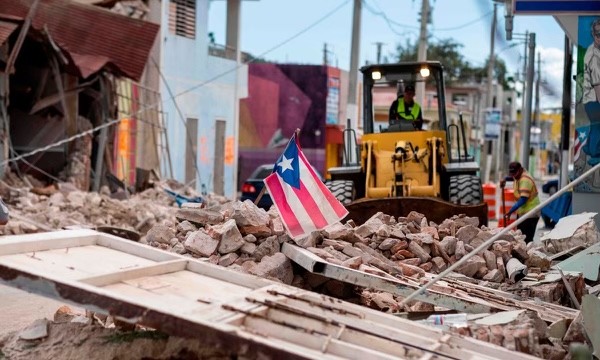On Three Kings Day 2020 Puerto Rico trembled. An earthquake of magnitude 5.8 on the Ritcher scale shook the residents of the island in the early morning of January 6.
Less than 24 hours later, the earth shook again. On January 7, a stronger 6.4 earthquake further damaged residences, historic buildings and natural icons on the island.
The series of earthquakes that began on December 28, 2019, continues. More than a dozen earthquakes were reported on the island on Christmas Eve 2020.
“On this anniversary of the earthquakes in Puerto Rico, my heart and spirit are with them,” said Amy Mercado, the first Puerto Rican elected as Orange County Property Appraiser.
“They are still recovering from so much. Not just earthquakes, but Maria and hurricanes. It is important that on this anniversary, we know what is happening and we are trying to help there and here,“ said Mercado, after being sworn in on Tuesday, January 5.
In the first months of 2020, Puerto Ricans affected by the quakes arrived in Central Florida.
“Many people arrived displaced, looking for a better future,” said the Rev. José Rodríguez, vicar of the Jesus of Nazareth Episcopal Church in Orlando. The church continues to assist this group, as well as Hurricane María survivors.
They encountered an affordable housing shortage and a strained system, said Rodríguez.
“It was harder for them because María has already complicated the situation here,” he said. “The few houses or the few low-income apartments and welfare resources reached the limit in the three years after María.”
Then came COVID-19 with a tsunami of layoffs that affected the Hispanic community, especially Latinos in the tourism industry. Amid the economic crisis, some refugees “could not find employment,” Rodríguez said.
“Most of them returned [to Puerto Rico],” said the community activist, indicating that he maintains communication with some 20 families who returned to Borinquen.
Central Florida lacks the resources to handle another wave of climate refugees, warned Rodríguez. “The few [families] that arrived after the earthquakes could not achieve much,” said Rodriguez.
“It is a wake-up call,” he added. “If a hurricane comes [this year], things will be very strong and very ugly.”
Only a handful of nonprofit organizations provide culturally competent assistance in Spanish, said Rodríguez. Among them are the Jesus of Nazareth Episcopal Church, the Hispanic Federation and Hispanic Office for Local Assistance (HOLA) – City of Orlando.
Ana Cruz, coordinator of HOLA witnessed the “boomerang” effect that these obstacles had on the population.
“Many families arrived, although I do not have numbers of how many were, or already are, or returned soon to the Island, which is what I imagine happened, but I have not heard from many families that have stayed in the area,” Cruz said.
“There is no housing for anyone,” said Cruz, adding the situation was already stressed after hurricane María. “We had nowhere to locate those families because so many came and at the same time,” Cruz recalled.
Mayra Uribe, Orange County District 3 commissioner, noted that “we have to act and make sure that those resources are available and more importantly the information [in Spanish] is available.”
That is what we lack. When people [who speak Spanish] come here there is no way for them to know what the county has to offer,“ Uribe said. “When you come here with a weakness and a need because you come from a difficult circumstance, we have to act so that you have the information to help process [your paperwork] and help your children and your family.”
